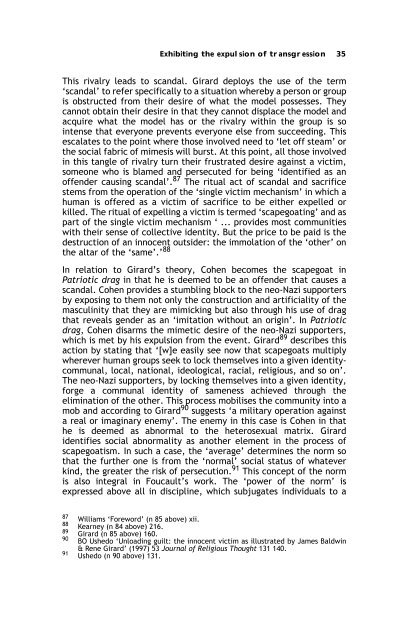Sex, Gender, Becoming - PULP
Sex, Gender, Becoming - PULP
Sex, Gender, Becoming - PULP
Create successful ePaper yourself
Turn your PDF publications into a flip-book with our unique Google optimized e-Paper software.
Exhibiting the expulsion of transgression 35<br />
This rivalry leads to scandal. Girard deploys the use of the term<br />
‘scandal’ to refer specifically to a situation whereby a person or group<br />
is obstructed from their desire of what the model possesses. They<br />
cannot obtain their desire in that they cannot displace the model and<br />
acquire what the model has or the rivalry within the group is so<br />
intense that everyone prevents everyone else from succeeding. This<br />
escalates to the point where those involved need to ‘let off steam’ or<br />
the social fabric of mimesis will burst. At this point, all those involved<br />
in this tangle of rivalry turn their frustrated desire against a victim,<br />
someone who is blamed and persecuted for being ‘identified as an<br />
offender causing scandal’. 87 The ritual act of scandal and sacrifice<br />
stems from the operation of the ‘single victim mechanism’ in which a<br />
human is offered as a victim of sacrifice to be either expelled or<br />
killed. The ritual of expelling a victim is termed ‘scapegoating’ and as<br />
part of the single victim mechanism ‘ ... provides most communities<br />
with their sense of collective identity. But the price to be paid is the<br />
destruction of an innocent outsider: the immolation of the ‘other’ on<br />
the altar of the ‘same’.’ 88<br />
In relation to Girard’s theory, Cohen becomes the scapegoat in<br />
Patriotic drag in that he is deemed to be an offender that causes a<br />
scandal. Cohen provides a stumbling block to the neo-Nazi supporters<br />
by exposing to them not only the construction and artificiality of the<br />
masculinity that they are mimicking but also through his use of drag<br />
that reveals gender as an ‘imitation without an origin’. In Patriotic<br />
drag, Cohen disarms the mimetic desire of the neo-Nazi supporters,<br />
which is met by his expulsion from the event. Girard 89 describes this<br />
action by stating that ‘[w]e easily see now that scapegoats multiply<br />
wherever human groups seek to lock themselves into a given identitycommunal,<br />
local, national, ideological, racial, religious, and so on’.<br />
The neo-Nazi supporters, by locking themselves into a given identity,<br />
forge a communal identity of sameness achieved through the<br />
elimination of the other. This process mobilises the community into a<br />
mob and according to Girard 90 suggests ‘a military operation against<br />
a real or imaginary enemy’. The enemy in this case is Cohen in that<br />
he is deemed as abnormal to the heterosexual matrix. Girard<br />
identifies social abnormality as another element in the process of<br />
scapegoatism. In such a case, the ‘average’ determines the norm so<br />
that the further one is from the ‘normal’ social status of whatever<br />
kind, the greater the risk of persecution. 91 This concept of the norm<br />
is also integral in Foucault’s work. The ‘power of the norm’ is<br />
expressed above all in discipline, which subjugates individuals to a<br />
87 Williams ‘Foreword’ (n 85 above) xii.<br />
88<br />
Kearney (n 84 above) 216.<br />
89 Girard (n 85 above) 160.<br />
90 BO Ushedo ‘Unloading guilt: the innocent victim as illustrated by James Baldwin<br />
& Rene Girard’ (1997) 53 Journal of Religious Thought 131 140.<br />
91 Ushedo (n 90 above) 131.
















